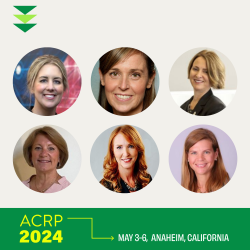Staffing and retention have been the top concern at research sites since 2020, with patient recruitment and enrollment ranking second, and the complexity of clinical trials ranking third, based on WCG survey data for 2020 to 2023. Carried out in February and March, 2023, the survey comprises responses from more than 500 U.S.-based clinical research sites.
Sandra Smith: Staffing and retention issues exacerbated by the pandemic
“While these workforce challenges affected research sites and sponsors prior to the pandemic, the need for clinical trials professionals has intensified, with an adverse impact on site capacity and patient access to trials,” notes Sandra Smith, RN, MSN, AOCN, Senior Vice President for Clinical Solutions and Strategic Partnering at WCG. To help address staffing issues, many organizations are offering training for new hires, especially since early career individuals are filling many open research roles. Smith points out that “workforce shortages span all research positions—clinical research coordinators, regulatory professionals, investigators, and research administrative functions (including finance and contracts).”
Initially, a lack of resources was exacerbated by the pandemic. Hospitals and other healthcare organizations shifted priorities to care for COVID-19 patients and carry out vaccine research, with involuntary reductions in the workforce. “Then came the ‘great resignation,’” says Smith. “The number of voluntary resignations in healthcare continued to climb, finally decreasing in the third quarter of 2023. While the situation has not yet stabilized, hiring is a little less challenging. High turnover continues. Often, new hires are far less experienced than the professionals they replace, requiring more training to match level of contribution made by their predecessors.”
The traditional ways of filling vacancies—such as use of staffing agencies, temps, and increased overtime—have fallen short of addressing staffing issues, according to Smith. Innovative approaches are needed to deliver workforce training and improved site capacity.
“Sponsors and sites should keep an open mind to new approaches, and not be afraid of trying something new,” concludes Smith. “Rather than requiring a full-time employee, some clinical research roles can be filled through novel clinical research partnerships, which can help meet organizational goals regardless of the staffing situation.”
Availability of qualified clinical research professionals will remain a leading concern in 2024, according to a WCG report on trends and insights in 2024.¹ Innovations in workforce development are predicted to continue to expand through research sites, professional organizations, and partnerships as the industry highlights the role of the clinical research professional as an intentional career choice.
Pioneering approaches to workforce challenges
Innovative approaches to workforce challenges and diversity, equity, and inclusion (DEI) issues are being implemented by various organizations. Several examples are described below: a sponsor that is driving inventive programs to build site capacity with a focus on DEI; a nonprofit organization focused on community grassroots efforts; a rural health system partnering with higher education to offer clinical research as an intentional career option; and an academic medical center pioneering pathways for new graduates to enter clinical research.
Kelly Clark and Leslie Wolfe: Committed to supporting site efforts
“We are running clinical trials at thousands of sites across the globe, and one of the most common concerns expressed by principal investigators and site staff is lack of resources,” says Kelly Clark, BScN, MSHS, Head of U.S. Partnerships and Global Site Development at Merck, known as MSD outside the U.S. and Canada. “It’s not uncommon for sites to turn down clinical trials due to lack of staff. As a sponsor, we are committed to helping support sites build a skilled and diverse workforce. This requires us to focus less on the staff’s years of experience and more on their skills. Sites are often hiring staff who are new to clinical research, so it’s important that these individuals have the competencies and foundational knowledge to start them on a path to a successful career. In 2023, we connected 140 clinical research staff across 25 sites with ACRP’s CRC Core Competency Foundations™ program for clinical research coordinators.”
This program prepares both inexperienced and experienced site staff to conduct complex clinical trials with high quality standards, states Clark. “ACRP’s programs are the gold standard for clinical research education. We are committed to partnering with the Association and with our sites to address the challenges still faced by the clinical research workforce. Our hope is to continue to expand the program to other sites both in the U.S. and across the globe in 2024 and beyond.”
“As part of Merck’s efforts to expand the clinical research workforce, we started a pilot program several years ago taking on new graduates who had been interns with us and who had no previous clinical research experience,” notes Leslie Wolfe, BS, MHA, Director, Clinical Research – Early Talent Development, at Merck. “This ‘intern-to-hire’ program included creation of a new, entry-level position where new hires were upskilled ready for a career in clinical research.”
Wolfe explains that “we recently expanded this to a rotational program offering experience within multiple areas and departments, giving a broader understanding of our industry and processes. This also included extending our recruitment outreach to non-traditional, clinical research naïve candidates, such as mid-career professionals in other fields, and new talent who have not completed a Merck internship. Once this rotational program has been completed, we aim to match each person’s skills and passions to an appropriate role, helping create satisfying, long-term careers. To date, around 80 individuals have come through this program and are now following widely varying career trajectories.”
In common with the programs aimed at supporting clinical research sites, this new rotational program at Merck also takes advantage of ACRP offerings, including the Association’s Early Talent Training Program™. “Merck values our collaboration with ACRP—it’s refreshing to work with an organization that looks holistically at the clinical research industry,” says Wolfe. “ACRP has successfully brought stakeholders together and acts as an effective advocate for all functions within clinical research.”
“Looking ahead, I’m very excited to see how participants in the new rotational program will transition into new roles as useful team members and resources for colleagues,” concludes Wolfe. “We are making promising steps towards the goal of building a bench of new clinical research professionals, with great feedback from everyone involved. This year, we look forward to continuing to build out and further improve this program.”
Michaele Linden Johnson: Life science incubator grows and diversifies the workforce
Funded entirely by grants, the mission of the Medical Center of the Americas (MCA) is to catalyze a globally competitive life science ecosystem for the Borderplex (West Texas, Southern New Mexico, and Juarez, Mexico) region, according to Michaele Linden Johnson, Senior Director of Clinical Trials and Business Development at the MCA. “Growing and diversifying this region’s clinical research workforce is a key element of our activities,” she says.
As a life science incubator, the MCA has several major programs, explains Linden Johnson:
- MCA Clinical Trial Academy, a program launched in partnership with ACRP and sponsored by Bristol Myers Squibb, aims to grow and diversify the Borderplex’s clinical research workforce and increase the number of sites offering clinical research as a care option in West Texas and Southern New Mexico.
- MCA Clinical Trial Network, sponsored by an American Rescue Plan Act grant via El Paso County and launched in partnership with High Enroll and the University of Texas Health School of Public Health, El Paso, aims to educate local providers and community health workers about clinical research and facilitate local access to trials. This involves referral to trials via MCA staff support, Clinical Trial Ambassadors, and ecosystem-wide use of High Enroll’s centralized open access mobile information technology platform.
Since launching the MCA’s Clinical Trial programs and initiatives seven years ago, the Borderplex region investigator site network grew more than three-fold from 19 to 71 sites, leading to a 492% increase in regional trial activity. In 2023, this trial activity supported 153 jobs and 379 trials, and brought an estimated $114 million of trial revenue to the Borderplex economy. During the year, clinical research training was provided for 107 clinical research coordinators, 16 principal investigators, and 17 community health workers.
“Looking ahead, as a nonprofit for community benefit, we aim make our region’s healthcare ecosystem more resilient by making more people aware of the benefits of clinical research and making it easier to refer patients to trials,” concludes Linden Johnson. “By growing our clinical research infrastructure, our goal is to apply global innovation to advance Latino healthcare.”
Lora Black: Ramping up workforce development efforts
“Sanford Health serves a largely rural area of some 200,000 square miles in North Dakota, South Dakota, Minnesota, and Iowa,” says Lora Black, Executive Director, Clinical Research–Sanford Research, Sanford Health. “Like many other organizations, our workforce challenges were exacerbated during the pandemic. We saw very high turnover rates, with experienced staff leaving to work for sponsors and contract research organizations, often for work-from-home opportunities that were available for the first time to professionals in our region.”
“We have ramped up our workforce development efforts to enable continuation of clinical programs we’d built up over the previous 15 to 20 years,” notes Black. “This included engaging with organizational leadership promote understanding around the time required to train clinical research staff, and investigating options to shorten this time.”
Black explains that Sanford Health worked with the University of South Dakota to create a training program to teach the fundamentals of clinical research. The fully online course is a 12-credit certificate involving four courses, enrolling the first cohort of students in fall 2023. “We are currently working on solidifying development of the final two courses, which will provide experiential and didactic learning approaches,” states Black. “This certificate program will support individuals focused on applying for entry-level positions in clinical research. We are also exploring the possibility of setting up internships to advance learning opportunities prior to an individual formally onboarding with the organization.”
Innovators in Action: Novel Programs Addressing Workforce and Enrollment Issues
Join Lora, Kelly, Michaele, Sandra, Leslie, and Denise at ACRP 2024 [May 3–6; Anaheim, Calif.], as they highlights industry pioneers with novel approaches to facing workforce challenges and diversity, equity, and inclusion (DEI) issues in clinical trials and overall trial enrollment. View complete schedule.

Looking ahead, Black says she’s optimistic that there will be good results from the training program, which offers the flexibility needed by undergraduates finishing their degrees or mid-career professionals wishing to switch to clinical research. “On the heels of the pandemic, we’re seeing greater recognition in our region of the value of clinical research to patients, public health, and health systems,” Black concludes. “We’re building this culture with marketing and education efforts, and I hope this will be just the beginning.”
Denise Snyder: Learning from one another’s successes
“Creating a cohesive and diverse workforce where individuals can thrive and advance in their careers depends on recruiting entry-level hires to replace people who have been promoted,” notes Denise Snyder, MS, RD, Associate Dean for Clinical Research, Duke University School of Medicine. “We can learn from one another’s successes to avoid reinventing the wheel, with workforce models being tailored to match each organization’s infrastructure and specific workforce needs.”
“At Duke, we’re looking hard at pathways for new graduates to enter clinical research,” adds Snyder. “As in other fields, careers in clinical research take a lifetime to build. Let’s be creative, inclusive, and patient as we look to support and develop the next generation of professionals.”
Reference
Edited by Jill Dawson



